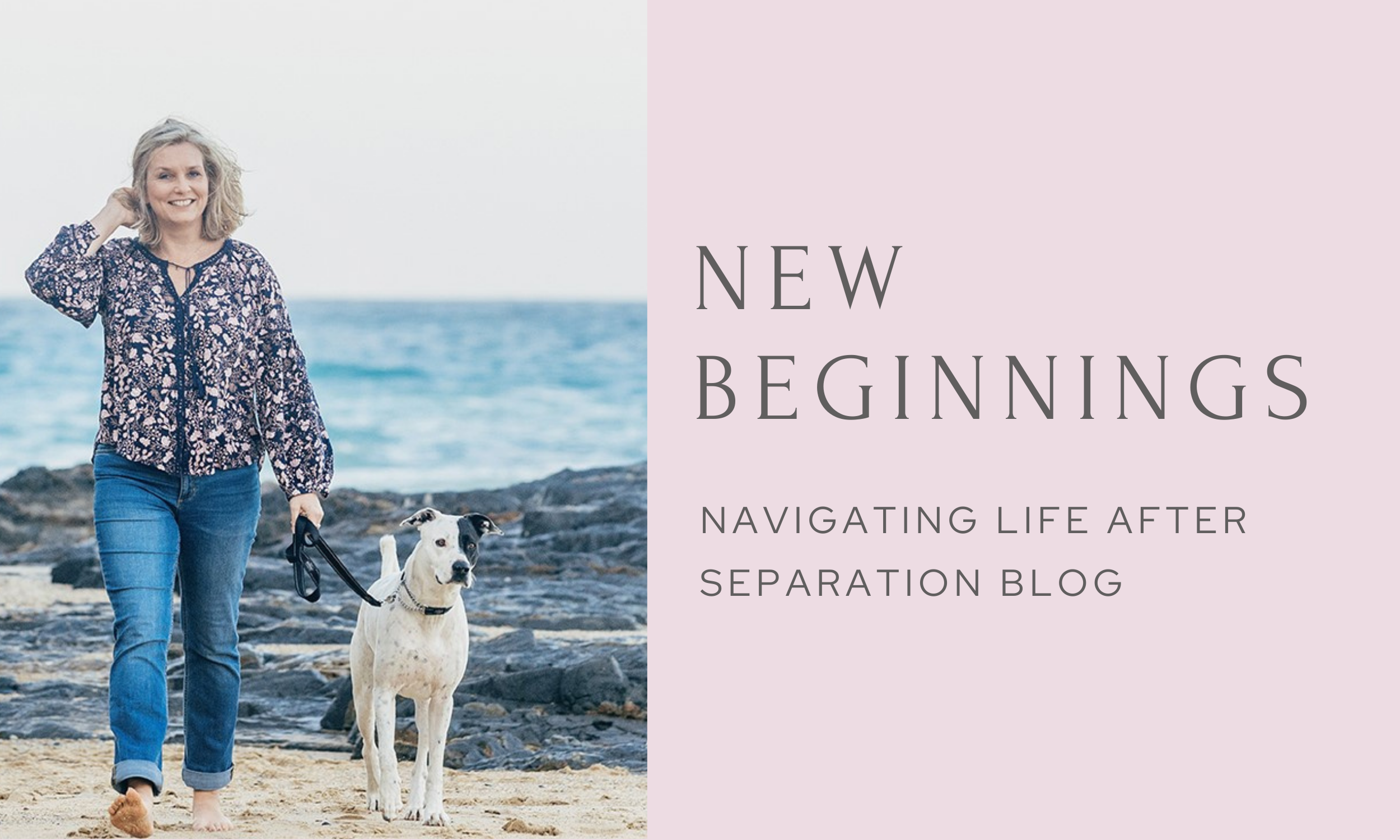Welcome to "New Beginnings: Navigating Life After Separation," a place where healing meets hope.
Our blog is dedicated to supporting and empowering those who are navigating the challenging waters of separation and divorce. Here, you will find resources designed to help you manage the emotional and practical aspects of this significant life transition.
Whether you're looking for advice on self-care, legal tips, or ways to rebuild and thrive post-divorce, our posts are crafted with care to provide you with insightful, practical, and uplifting content. Our goal is to assist you in transforming a period of change into a journey of growth and new possibilities.
Join us as we explore topics ranging from emotional healing to practical steps for moving forward, all aimed at helping you embrace your new beginning. Let’s start this transformative journey together, with resilience, understanding, and optimism.
The antidote to heavy emotions…
Let’s be honest.
When you’re going through separation, the idea of being grateful can feel… a little ridiculous.
You’re grieving.
You’re exhausted.
You’re figuring out how to hold everything together when half of it just fell apart.
And then someone on the internet says, “Just practice gratitude.” 😵💫
I get it — it can feel a little tone-deaf at first.
But here’s the thing I always share with my coaching clients:
Gratitude isn’t about ignoring the hard stuff.
It’s about remembering the good that still exists — even in the middle of the storm.
It’s not an either/or.
You can be sad… and still find one thing to be thankful for.
You can feel anxious… and still notice something steady in
your day.
You can be angry… and still take a breath that calms your nervous system.
Gratitude doesn’t erase the pain — it creates room around it.
From panic to peace…
Let’s talk about those moments that sneak up on you.
You know the ones I mean — when you’re doing okay (or at least holding it together)…
and suddenly, your chest tightens. Your thoughts start racing. Your heart is pounding and you’re not sure what triggered it.
Sometimes it’s a conversation.
Sometimes it’s silence.
Sometimes it’s nothing at all.
And suddenly, you're overwhelmed by emotion — anxiety, sadness, confusion — like you're caught in a storm without an umbrella.
I see this all the time with clients I work with during separation and divorce. They say things like:
“I don’t know what’s wrong with me. I was fine, and now I can’t breathe.”
“It just hits out of nowhere — the tears, the panic, the fear.”
“My mind goes into overdrive and I feel like I can’t shut it off.”
Sound familiar?
If so, here’s your gentle reminder:
🌀 You’re not broken.
🌀 This is normal.
🌀 And you can do something about it — in the moment — to find calm again.
Riding the emotional rollercoaster…
There’s a moment that happens for so many clients I work with…
They’ve made the decision. The relationship is over. The logistics are starting to fall into place. Maybe they’ve even had a few good days.
And then — out of nowhere — wham.
A tidal wave of emotion hits.
Grief. Anger. Guilt. Loneliness. Fear. Hope. Regret. Relief.
All tumbling over each other like waves in a storm.
And the first thing they ask me is:
“Why am I still feeling like this?”
“Shouldn’t I be over it by now?”
“Why does it change every single day?”
Anger is normal…
One of the things I hear most often from women after separation is this:
“I don’t know what’s wrong with me… I’m just so angry all the time.”
Angry at their ex.
Angry at the situation.
Angry at how unfair it all feels.
And, maybe most of all, angry at themselves — for feeling this way at all.
But here’s the truth I always share with them:
💬 Anger is not a problem. It’s a message.
It’s your nervous system saying something mattered, and that something important was lost.
And in the context of separation? That could be trust. Safety. A dream. A future you’d built your life around.
Wine, rebounds andretail therapy…
The first Friday night after your separation, you find yourself standing in front of the fridge with a glass of rosé in hand, still wearing the clothes you cried in all day. Your kids were finally asleep.
The silence in the house was so loud it buzzed in your ears. It was not drinking to enjoy the wine, but so you wouldn’t feel the lump in your throat.
So you wouldn’t sit down on the floor and fall apart.
So you wouldn’t have to think about how empty the bed — and life — suddenly felt.
And for a while, it helped.
Until it didn’t.
Co-parenting 101
I’ll never forget the moment one of my clients, lets call her Jenna, looked at me and said,
“We made a plan. But it just… doesn’t work in real life.”
She was referring to the parenting plan she and her ex had scribbled down when they first separated — filled with good intentions, but no real guidance.
At first, they agreed on the basics:
Week-on, week-off.
Half the school holidays each.
Communication through emails
It sounded fair.
It looked neat on paper.
But then life happened.
Soccer training was moved to Thursdays.
One child refused to pack her bag.
The other wanted to FaceTime every night he wasn’t at Mum’s.
And the emails started piling up.
Jenna didn’t need a “fair” plan. She needed a realistic one — something that worked for them, not some idealised version of separated parenting.
If that’s where you are right now, you’re not failing — you’re human. And the good news is, there is a better way.
From conflict to cooperation
There’s a moment I won’t forget.
A mum — let’s call her Amy — sat across from me in my office, holding a crumpled tissue and a phone filled with long, angry text threads. Her eyes welled up as she said, “We just can’t talk anymore. Every time I try to sort out something simple, like who’s taking our child to soccer, it turns into a full-blown argument.”
I hear this a lot. Two people who used to share a life — a home, a future, maybe even dreams of growing old together — are now reduced to tense messages about pick-up times and forgotten library books.
And while they both want what’s best for their children, communication becomes a battlefield.
If you’re nodding right now, I want you to know: you’re not alone. More importantly, you’re not powerless.
As a family lawyer and a divorce coach, I’ve worked with many parents just like Amy. And I’ve seen how things can shift — not overnight, but with the right tools, a different mindset, and a focus on what truly matters.
So, if communication with your co-parent feels like walking through a minefield, take a breath. Let’s talk about how to walk a better path — one that leads toward cooperation, not conflict.
Handling last-minute changes without losing your cool
That moment when it all unravels…
Maybe you know this feeling:
You’ve made a plan with your co-parent.
You’ve organised school uniforms, packed lunches, updated the calendar.
You finally feel like you’re getting into a rhythm.
And then — bam. A last-minute text.
“Hey, can’t do pick-up.”
“Something’s come up.”
“Can you swap weekends?”
You pause. Your stomach tightens.
Because it’s not just about a plan changing — it’s about the emotional load of always being the one who adjusts, who stretches, who picks up the slack.
I’ve sat across from so many parents who’ve said:
“I want to be flexible. But I’m tired of being the only one who is.”
If that’s you — I see you.
Let’s talk about how to hold both compassion and boundaries when plans change. Again.
Mother’s Day
With Mother’s Day coming up, I’ve been sitting with something that comes up time and time again in my sessions with women after separation:
“I just feel so depleted. I want to be a great mum, but I have nothing left in the tank.”
Maybe you know the feeling?
For many mothers, especially after a separation, Mother’s Day can stir up a whole cocktail of emotions—gratitude, guilt, grief, exhaustion. It is supposed to be a day of appreciation, but for some, it highlights how invisible they feel.
And yet... there is something powerful about this day. A quiet invitation.
To reflect. To reconnect.
To ask: “What do I need now?”
Your financial future after divorce
When you’re raising children after separation, the word “security” takes on a whole new meaning.
It is no longer just about bills and bank balances.
It’s about keeping the school routine smooth, making sure the fridge is full, covering sports fees, and still having enough emotional bandwidth left at the end of the day to be present.
That is a lot for one person to carry.
If you’re finding yourself standing at the edge of your property settlement wondering how you’re going to make it all work—financially, emotionally, and practically—please take a deep breath.
💡 This is not the end of your old life. It is the beginning of your new one.
And that new life can be strong, steady, and peaceful—not just for you, but for your children too.

















